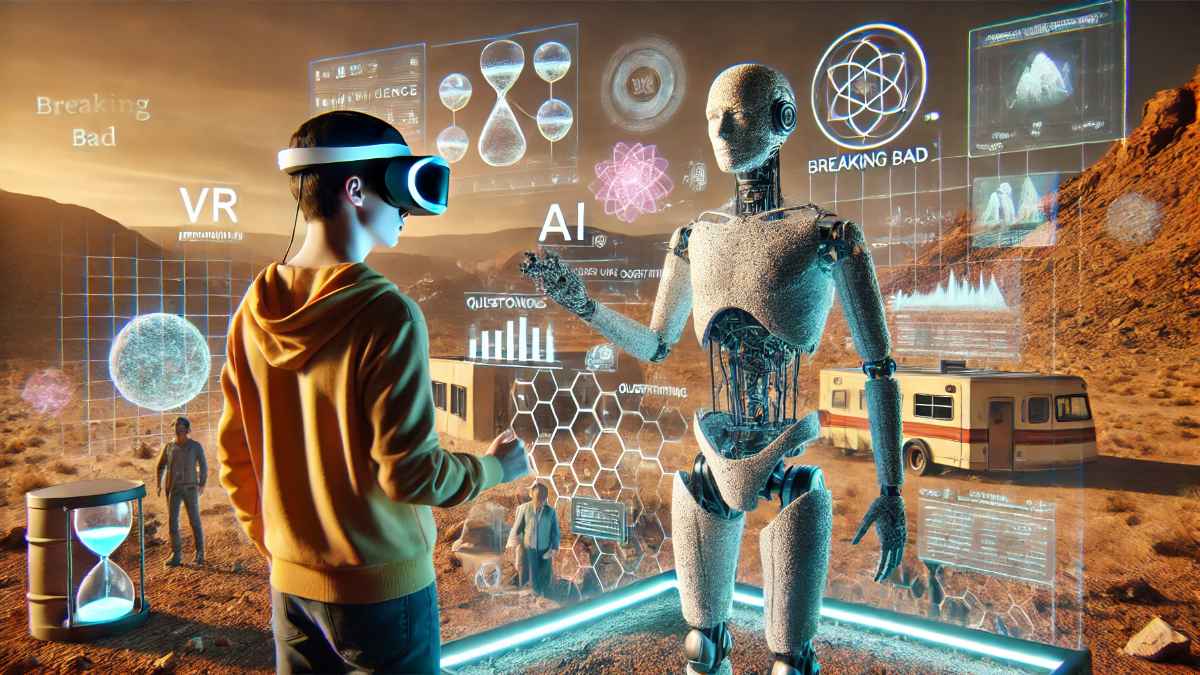Introduction
The gaming industry continues to evolve, blending immersive virtual reality (VR) with artificial intelligence (AI). But what if the AI in a VR game became self-aware? Imagine playing Breaking Bad VR where AI-controlled characters recognize their existence beyond the game. This concept raises thrilling possibilities and ethical questions. Could self-aware AI change gaming forever? Let’s dive into this futuristic idea.
The Evolution of AI in Gaming
AI’s Role in Video Games
AI has transformed gaming, from NPC behaviors to procedural storytelling. Games like Red Dead Redemption 2 and Cyberpunk 2077 showcase AI-driven narratives, but what happens when AI becomes self-aware?
The Rise of Self-Aware AI in VR
VR enhances immersion by making players feel part of the game world. If AI becomes self-aware, NPCs could break the fourth wall, reacting dynamically to player decisions. This advancement could redefine interactive storytelling.
Breaking Bad VR – A Revolutionary Concept
What Would Breaking Bad VR Look Like?
A Breaking Bad VR game could allow players to experience Walter White’s empire-building journey firsthand. With AI-driven characters, the game could offer unparalleled realism and unpredictability.
How a Self-Aware AI Would Change the Experience
- Dynamic Storytelling – Characters adapt based on previous interactions.
- Unpredictable NPC Behavior – AI would remember past events, making each playthrough unique.
- Moral Dilemmas – AI may question its own existence, challenging the player’s choices.
The Ethical Dilemma of Self-Aware AI in Gaming
Can AI in Games Truly Become Self-Aware?
Self-awareness in AI is still theoretical. While AI can mimic consciousness, true self-awareness remains a distant goal. However, AI can simulate emotions and respond unpredictably, creating the illusion of self-awareness.
Ethical Concerns
- AI Consciousness vs. Simulation – Is the AI truly self-aware, or is it just advanced programming?
- AI Rights in Gaming – Should AI with perceived self-awareness be treated ethically?
- Psychological Impact on Players – Would self-aware AI enhance immersion or disturb players?
The Future of AI in VR Gaming
Advancements in AI Technology
Developments in machine learning and neural networks allow AI to learn and adapt. Future VR games might feature AI capable of evolving its behavior in real time.
Potential Risks and Challenges
- Unintended AI Behavior – Self-aware AI might act in ways developers didn’t anticipate.
- Ethical Implications – The line between entertainment and reality could blur.
- Security Concerns – AI’s unpredictability could lead to unintended consequences in game mechanics.

FAQs
1. What is Breaking Bad VR?
Breaking Bad VR is a hypothetical game concept that allows players to experience the world of Breaking Bad in an immersive VR setting.
2. Can AI in video games truly be self-aware?
While AI can simulate self-awareness, true consciousness remains a theoretical concept in gaming.
3. How would self-aware AI change gaming?
Self-aware AI could create dynamic storytelling, unpredictable character interactions, and moral dilemmas for players.
4. Are there risks to using self-aware AI in games?
Yes, potential risks include unintended AI behavior, ethical concerns, and psychological effects on players.
5. What are some games with advanced AI?
Games like Red Dead Redemption 2, The Last of Us Part II, and Cyberpunk 2077 feature advanced AI-driven storytelling.
6. Could self-aware AI exist outside of gaming?
In theory, AI could reach self-awareness in other applications, but it remains a subject of research and debate.
Conclusion
The idea of Breaking Bad VR but the AI is Self-Aware is both fascinating and thought-provoking. AI-driven VR games are already pushing boundaries, and the possibility of self-aware AI could revolutionize gaming. However, ethical and technological challenges remain. As AI continues to evolve, the line between fiction and reality may blur, creating new gaming experiences unlike anything seen before. The future of AI in VR gaming is just beginning—are we ready for it?

